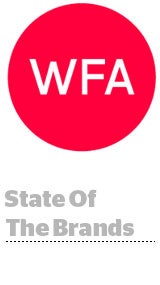 Here’s today’s AdExchanger.com news round-up… Want it by email? Sign up here.
Here’s today’s AdExchanger.com news round-up… Want it by email? Sign up here.
Brandgry
Brands are taking back control of their media spend, according to European marketer trade body World Federation of Advertisers (WFA). WFA released a report Wednesday surveying 35 global advertisers with a total annual marketing spend of $30 billion. Transparency is the top concern for 47% of marketers, and 58% have started to take digital capabilities in-house with programmatic leadership roles. Over half of marketers surveyed have updated agency contracts to define agencies as “principals” or “agents.” Brands are also getting smarter about where they place their dollars. Eighty-nine percent have suspended buys from ad networks without third-party verification and 64% only buy verified viewable impressions. More at WSJ.
Your Earliest Convenience
Amazon is planning a convenience store rollout where Prime members can order and instantly pick up a selection of “daily essentials,” according to a release. The program starts in five cities – student-rich Los Angeles, Atlanta, Berkeley, Columbus and College Park. More at Ars Technica. How will it impact CPG strategy? Ryan Sullivan, VP of performance marketing services at the Publicis agency Performics, recently told AdExchanger a CPG company’s paper towel brand had been escalating paid media on Amazon, in part to jockey for position on Alexa. Will the same logic apply to convenience stores down the line?
Under The Influence
Facebook’s decision to allow brands to boost sponsored influencer posts may force them to spend even more on the platform, Digiday reports. By allowing advertisers to put spend behind branded influencer posts, marketers fear non-promoted influencer content will be demoted. “Most brands are using influencers on Facebook to rely on their following base for organic reach,” said Matt Britton, CEO of influencer marketing company Crowdtap. “But now, in order for brands to support influencer posts, they have to pay to play.” By de-emphasizing the importance of organic reach, influencers lose their value on Facebook and influencer marketing on the platform gets much more expensive. “Facebook just eradicated influencer marketing,” Britton said. More.
But Wait, There’s More!
- Apple Readies $1 Billion War Chest For Hollywood Programming – WSJ
- How Stop-And-Go Onboarding Goes Off The Rails – The Drum
- 4C Surpasses $1B Annual Media Spend On Platform – release
- AppNexus: An Interview With Oath Solutions Engineer Jeremy Blencowe – blog
You’re Hired!
- Gain Theory Names Russell Nuzzo Global Head of Attribution – release
- PebblePost Expands Leadership Team – release











